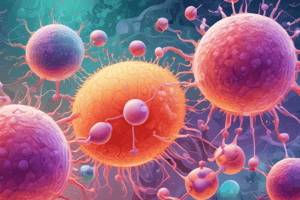Podcast
Questions and Answers
What is the primary response to exposure to antigens in the context of acquired immunity?
What is the primary response to exposure to antigens in the context of acquired immunity?
- Initiation of antibody development or T lymphocyte synthesis (correct)
- Immediate production of antibodies
- Gradual development of memory cells
- Rapid and extensive synthesis of T lymphocytes
Why do bacteria or viruses only cause one episode of a particular disease according to the text?
Why do bacteria or viruses only cause one episode of a particular disease according to the text?
- Because the body forms antibodies rapidly
- Due to mutations and changes in the organisms
- As a result of the presence of disease-specific antibodies in memory (correct)
- Because children easily form antibodies against infections
What is the characteristic of bacteria and influenza viruses mentioned in the text?
What is the characteristic of bacteria and influenza viruses mentioned in the text?
- They easily invade the respiratory tract
- They cause infections more frequently in children
- They mutate and change over time requiring new vaccines (correct)
- They are composed of 100 different antigens
When is active immunity formed according to the text?
When is active immunity formed according to the text?
What is the role of the skin and mucosa in the human body's defense mechanism?
What is the role of the skin and mucosa in the human body's defense mechanism?
What is the function of lymphoid tissue in the immune system?
What is the function of lymphoid tissue in the immune system?
What is the main function of lymphocytes in the immune system?
What is the main function of lymphocytes in the immune system?
What is the significance of acquired immunity in the human body?
What is the significance of acquired immunity in the human body?
What is the main function of Helper T cells?
What is the main function of Helper T cells?
How are Helper T cells activated?
How are Helper T cells activated?
What is the main role of Killer T cells in the immune system?
What is the main role of Killer T cells in the immune system?
What do plasma cells produce?
What do plasma cells produce?
What is the main function of the complement system?
What is the main function of the complement system?
What is the role of antigens in the immune system?
What is the role of antigens in the immune system?
What is the function of macrophages in the immune system?
What is the function of macrophages in the immune system?
What is the purpose of the specific adaptive response in the immune system?
What is the purpose of the specific adaptive response in the immune system?
Flashcards are hidden until you start studying
Study Notes
Acquired Immunity
- Exposure to antigens triggers a primary response, leading to the activation of immune cells and the production of antibodies.
Immunity to Disease
- Bacteria or viruses can only cause one episode of a particular disease because the immune system remembers the pathogen and mounts a specific response to eliminate it.
Characteristics of Bacteria and Influenza Viruses
- Bacteria have cell walls and can cause infection.
- Influenza viruses are highly mutable and can change their surface antigens, making it difficult for the immune system to recognize them.
Active Immunity
- Active immunity is formed when the body mounts a specific response to a pathogen, such as through vaccination or infection.
Skin and Mucosa Defense
- The skin and mucosa act as barriers to prevent pathogen entry into the body.
Lymphoid Tissue
- Lymphoid tissue, such as lymph nodes and spleen, filters out pathogens and activates immune responses.
Lymphocytes
- Lymphocytes, such as T cells and B cells, recognize and respond to specific pathogens.
Acquired Immunity Significance
- Acquired immunity provides long-term protection against specific pathogens, allowing the body to remember and respond to future infections.
Helper T Cells
- Helper T cells (CD4+) recognize and respond to specific pathogens, activating other immune cells to respond.
- Helper T cells are activated by antigen presentation from antigen-presenting cells.
Killer T Cells
- Killer T cells (CD8+) directly kill infected cells that display viral or tumor antigens on their surface.
Plasma Cells
- Plasma cells produce antibodies, which are proteins that recognize and bind to specific pathogens.
Complement System
- The complement system is a group of proteins that work together to help eliminate pathogens from the body.
Antigens
- Antigens are molecules that can trigger an immune response, such as proteins, carbohydrates, and other molecules on the surface of pathogens.
Macrophages
- Macrophages engulf and digest foreign particles and pathogens, activating immune responses.
Specific Adaptive Response
- The specific adaptive response is the targeted immune response to specific pathogens, providing long-term protection against future infections.
Studying That Suits You
Use AI to generate personalized quizzes and flashcards to suit your learning preferences.




